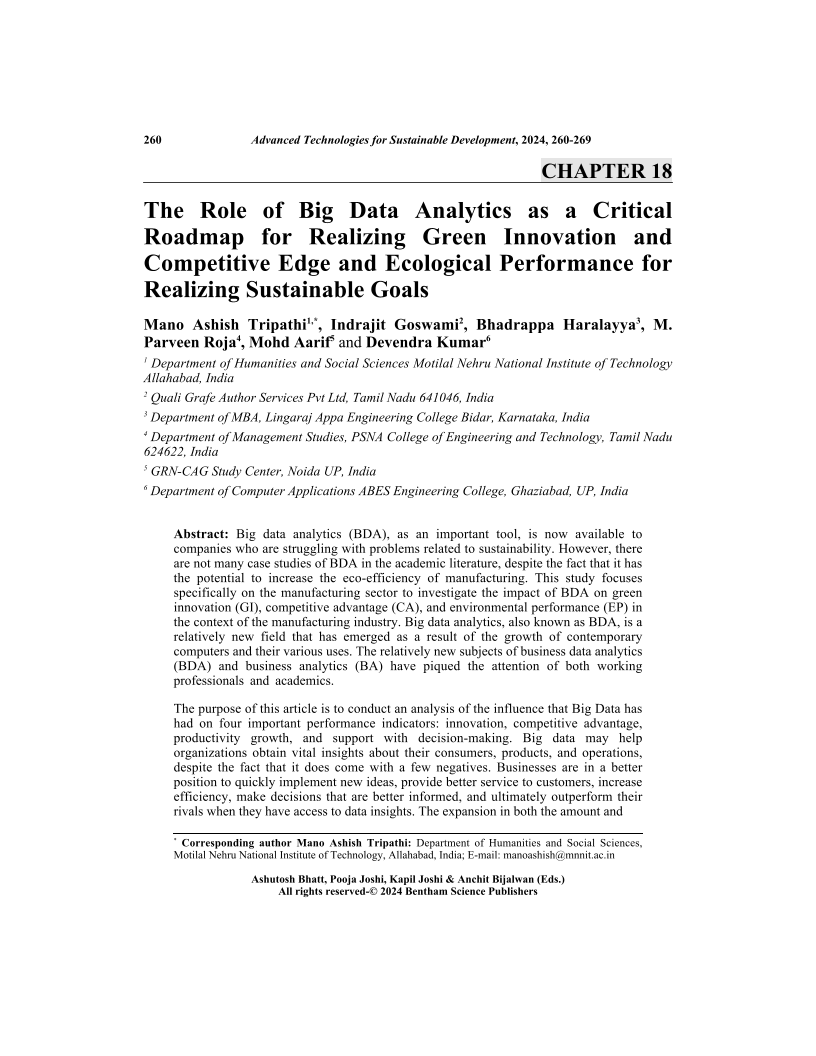The Role of Big Data Analytics as a Critical Roadmap for Realizing Green Innovation and Competitive Edge and Ecological Performance for Realizing Sustainable Goals

- Authors: Mano Ashish Tripathi1, Indrajit Goswami2, Bhadrappa Haralayya3, M. Parveen Roja4, Mohd Aarif5, Devendra Kumar6
-
View Affiliations Hide Affiliations1 Department of Humanities and Social Sciences Motilal Nehru National Institute of Technology, Allahabad, India 2 Quali Grafe a Services Pvt Ltd, Tamil Nadu 641046, India 3 Department of MBA, Lingaraj Appa Engineering College Bidar, Karnataka, India 4 Department of Management Studies, PSNA College of Engineering and Technology, Tamil Nadu, 624622, India 5 GRN CAG Study Center, Noida UP, India 6 Department of Computer Applications ABES Engineering College, Ghaziabad, UP, India
- Source: Advanced Technologies for Realizing Sustainable Development Goals: 5G, AI, Big Data, Blockchain, and Industry 4.0 Application , pp 260-269
- Publication Date: October 2024
- Language: English
The Role of Big Data Analytics as a Critical Roadmap for Realizing Green Innovation and Competitive Edge and Ecological Performance for Realizing Sustainable Goals, Page 1 of 1
< Previous page | Next page > /docserver/preview/fulltext/9789815256680/chapter-18-1.gif
Big data analytics (BDA), as an important tool, is now available to companies who are struggling with problems related to sustainability. However, there are not many case studies of BDA in the academic literature, despite the fact that it has the potential to increase the eco-efficiency of manufacturing. This study focuses specifically on the manufacturing sector to investigate the impact of BDA on green innovation (GI), competitive advantage (CA), and environmental performance (EP) in the context of the manufacturing industry. Big data analytics, also known as BDA, is a relatively new field that has emerged as a result of the growth of contemporary computers and their various uses. The relatively new subjects of business data analytics (BDA) and business analytics (BA) have piqued the attention of both working professionals and academics. The purpose of this article is to conduct an analysis of the influence that Big Data has had on four important performance indicators: innovation, competitive advantage, productivity growth, and support with decision-making. Big data may help organizations obtain vital insights about their consumers, products, and operations, despite the fact that it does come with a few negatives. Businesses are in a better position to quickly implement new ideas, provide better service to customers, increase efficiency, make decisions that are better informed, and ultimately outperform their rivals when they have access to data insights. The expansion in both the amount andquality of the data that is now accessible has led to improvements in the capacities of organizations as well as the opening of new doors leading to growth. Businesses are renouncing established practices in favor of new, inventive, and innovative techniques in order to redefine creativity, competitiveness, and productivity. It is vital, for the sake of achieving sustainable objectives, to have an understanding of big data analytics as a critical component of the road map for green innovation, competitive advantage, and ecological performance.
-
From This Site
/content/books/9789815256680.chapter-18dcterms_subject,pub_keyword-contentType:Journal -contentType:Figure -contentType:Table -contentType:SupplementaryData105

